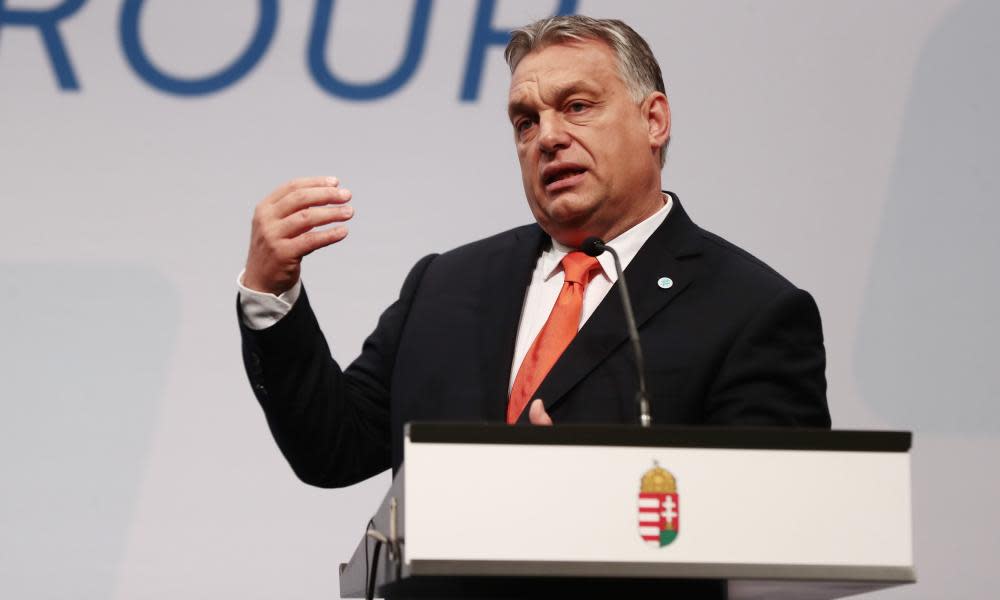MEPs vote to activate sanction process against Hungary

British Conservatives are under fire in Brussels after voting against triggering an EU sanction process against Hungary over violations of the rule of law under the prime minister, Viktor Orbán.
MEPs on the civil liberties, justice and home affairs committee voted to launch the EU’s disciplinary procedure against the country, a lengthy legal process that could lead to Hungary being stripped of EU voting rights.
But the Tories stood accused of trampling over their own legacy, after their MEP on the committee voted against the process, a decision described as “an exit from European values” by a leading politician from a rival party.
Hungary is very unlikely to lose its voting rights, but the unprecedented vote on Monday is a symbolic move against Orbán, who was re-elected for a third term in April, after a campaign that international observers said had clearly favoured the ruling coalition and was characterised by intimidating and xenophobic rhetoric.
“This is a damning indictment of the state of British European policy and completely destroys any credibility the Tories might have left,” said Sophie in ’t Veld of the Dutch Democrats 66 party, who is on the committee.
“Even Conservative governments of the recent past were always promotors of democracy and the rule of law in central and eastern Europe, but in providing cover for Orbán’s descent into authoritarianism, they have trampled on this legacy.”
“Voting with Orbán is the true Tory Brexit: the exit from European values,” she said, adding that it was a sad day.
Conservative MEPs also voted against taking similar action against Poland, fuelling concerns about whether a Brexit-bound government would sideline democratic values to curry favour with autocratic governments.
Conservative home affairs spokesman Daniel Dalton said: “The extremely one-sided report I voted against today was an inappropriate attempt by the European parliament to insert itself into domestic political battles. Recent attempts to raise domestic controversies to a European level are both wrong and counterproductive, alienating many citizens who feel their countries are being unfairly targeted by the European institutions.”
The decision by MEPs throws down a gauntlet to Europe’s most powerful political alliance, the European People’s party (EPP), the group Angela Merkel and Jean-Claude Juncker are a part of, which has been accused of legitimatising Orbán by keeping his Fidesz party in its ranks.
Josef Weidenholzer, an Austrian Social Democrat MEP, said the EU had to act. “Hungary is now in a situation – [where] we would call it it a facade democracy.”
The vote is only a first step; a final decision to launch the procedure requires a two-thirds majority in the European parliament.
If a majority of MEPs vote in September, ministers will be obliged to consider whether there is a serious and persistent breach of the EU’s basic democratic values in Hungary.
The Dutch Green MEP Judith Sargentini had spent 13 months drafting a report to prepare for the unprecedented procedure. It is based on the work of many international organisations and raises 12 key concerns about the erosion of democracy in Hungary.
The draft report highlights fears about the functioning of Hungary’s constitution, which has been amended six times since 2012. It also itemises concerns about the centralisation of justice, declining transparency over state funds and threats to freedom of expression and the right to equal treatment.
The report was completed before the Hungarian parliament passed widely criticised anti-immigrant laws last week that made it a criminal offence punishable by a jail term to help people lodge asylum claims.
The European commission is “now going to review the Hungarian legislation on migration to determine whether it is compatible with European rules”, a spokeswoman said last week.
Hungary’s response was made plain in a radio interview during which Orbán lashed out at the commission for “pestering, pressuring and attacking Poland” and “attacking Hungary”.
In a statement to Hungarian media, Orbán said the vote was a way of “apply[ing] pressure to Hungary so that it changes its standpoint with relation to migration. But in view of the fact that Hungarian voters have already decided on this issue, there is nothing more to talk about.”
He described Sargentini, as “one of George Soros’s people”, in a now familiar attack against the billionaire philanthropist, the EU and civil society groups. Orbán has long demonised the Hungarian-born Soros in a relentless campaign widely seen to have antisemitic overtones.
Orbán has long accused the EU of overreaching its powers, a charge he has stepped up in recent years with a “Stop Brussels” campaign. He said the anti-immigration legislation had been flagged up in the electoral campaign. “The people wanted this and the people voted for this,” Orbán told state radio last week. “Who would dare to criticise or condemn the 80 or 90% decision of a country’s legislature?”
The EU triggered the rule of law process for the first time in 2017, when it took action against Poland for changes to the judiciary that international experts say threaten the rule of law.
Poland’s EU affairs minister will appear before his 27 counterparts from the other member states at a hearing on Tuesday, where he will seek to counter the charge of a “systemic threat” to Polish democracy.

 Yahoo News
Yahoo News 
